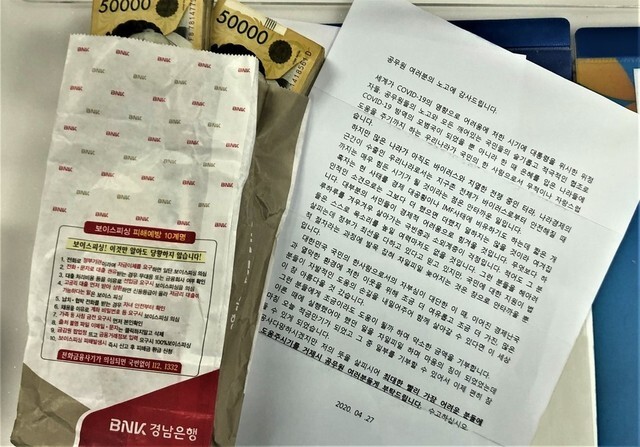hankyoreh
Links to other country sites 다른 나라 사이트 링크
[Editorial] Movement for donating disaster allowances should not become pressure campaign

A growing movement is emerging as more and more people have declared plans to donate their basic disaster allowances in response to the novel coronavirus outbreak. South Koreans are increasingly announcing plans to donate funds from the local governments that are already paying disaster relief. People are also declaring plans to donate disaster allowances from the central government that are scheduled to be paid in May. This is a hard time for everyone, but it seems like a positive development from the standpoint of building solidarity and mutual benefits to overcome this crisis. This is a time when those who have more to spare are reaching out to aid those in a more difficult position. We look forward to seeing this trend spreading even more widely.
Meritz Financial Group announced on Apr. 29 that around 2,700 employees from all of its affiliates who earned 50 million won (US$41,447) or more in income last year had agreed to voluntarily donate their emergency disaster relief allowances. The emergency disaster support for all South Korea is to be funded from the second supplementary budget, with benefits amounting to 1 million won (US$829) for a four-person household to be paid out before May 15. Meritz also announced that it would provide support to any employees who need it after taking part in the donations, while taking steps to ensure their anonymity. Eighteen central executives from the Society for a Better Tomorrow and the chairs of 17 metropolitan and provincial councils announced their intent to participate as well.
Donations are already being made at the local government level. As of Apr. 27, a total of 291 million won had been raised through 2,737 donations to Gyeonggi Province through its provincial Community Chest. Active donation campaigns are under way among residents in Busan’s Gijang County -- which was the first local government in South Korea to pay a basic disaster allowance -- as well as Suwon in Gyeonggi Province and Jangsu County and the city of Iksan in North Jeolla Province.
On Apr. 27, a middle-aged man visited the public service center at Geoje City Hall in South Gyeongsang Province and left an envelope behind, asking for it to be used for people left struggling as a result of the virus. It contained 10 million won (US$8,290) in cash, along with a letter that began with the words, “I am immensely proud to be a citizen of the Republic of Korea, which has become a model of coronavirus prevention.”
The South Korean government plans to grant tax benefits (a 15% deduction) for donations; hopefully it will also simplify the procedures to allow supportive members of the public to donate easily. The example of the city of Iksan, which will be allowing donations through a single call to its call center (1577-0072) as of Apr. 28, is worth using as a reference. The government plans to use donations from the public to preserve jobs and support unemployed persons, and it goes without saying that particular attention should be paid to allocating it in an efficient and transparent manner.
Without question, donations need to be 100% voluntary in nature. They cannot be allowed to take on a coercive aspect or transform into a “government-driven campaign.” It distorts the aims of donations for all government employees to simply follow along with the donations the president, the ministers and vice ministers are making. The same is true for companies. We must be on guard against people feeling explicit or implicit pressure to donate. We should not forget that the basic aim of donating is to harness the public’s will to overcome a disaster and to establish “trust capital” through stronger social solidarity.
Please direct comments or questions to [english@hani.co.kr]

Editorial・opinion
![[Editorial] Intensifying US-China rivalry means Seoul must address uncertainty with Beijing sooner than later [Editorial] Intensifying US-China rivalry means Seoul must address uncertainty with Beijing sooner than later](https://flexible.img.hani.co.kr/flexible/normal/500/300/imgdb/original/2024/0517/8117159322045222.jpg) [Editorial] Intensifying US-China rivalry means Seoul must address uncertainty with Beijing sooner than later
[Editorial] Intensifying US-China rivalry means Seoul must address uncertainty with Beijing sooner than later![[Column] When ‘fairness’ means hate and violence [Column] When ‘fairness’ means hate and violence](https://flexible.img.hani.co.kr/flexible/normal/500/300/imgdb/original/2024/0516/7417158465908824.jpg) [Column] When ‘fairness’ means hate and violence
[Column] When ‘fairness’ means hate and violence- [Editorial] Yoon must stop abusing authority to shield himself from investigation
- [Column] US troop withdrawal from Korea could be the Acheson Line all over
- [Column] How to win back readers who’ve turned to YouTube for news
- [Column] Welcome to the president’s pity party
- [Editorial] Korea must respond firmly to Japan’s attempt to usurp Line
- [Editorial] Transfers of prosecutors investigating Korea’s first lady send chilling message
- [Column] Will Seoul’s ties with Moscow really recover on their own?
- [Column] Samsung’s ‘lost decade’ and Lee Jae-yong’s mismatched chopsticks
Most viewed articles
- 1For new generation of Chinese artists, discontent is disobedience
- 2[Editorial] Transfers of prosecutors investigating Korea’s first lady send chilling message
- 3S. Korea “monitoring developments” after report of secret Chinese police station in Seoul
- 4Xi, Putin ‘oppose acts of military intimidation’ against N. Korea by US in joint statement
- 5[Exclusive] Unearthed memo suggests Gwangju Uprising missing may have been cremated
- 6N. Korean media upgrades epithet for leader’s daughter from “beloved” to “respected”
- 7Yoon says concern about biased diplomacy is being incited by “communist totalitarian forces”
- 8[Column] US troop withdrawal from Korea could be the Acheson Line all over
- 9[Editorial] Intensifying US-China rivalry means Seoul must address uncertainty with Beijing sooner t
- 10[Interview] Recalling seeing soldiers secretly burying bodies behind Gwangju Prison